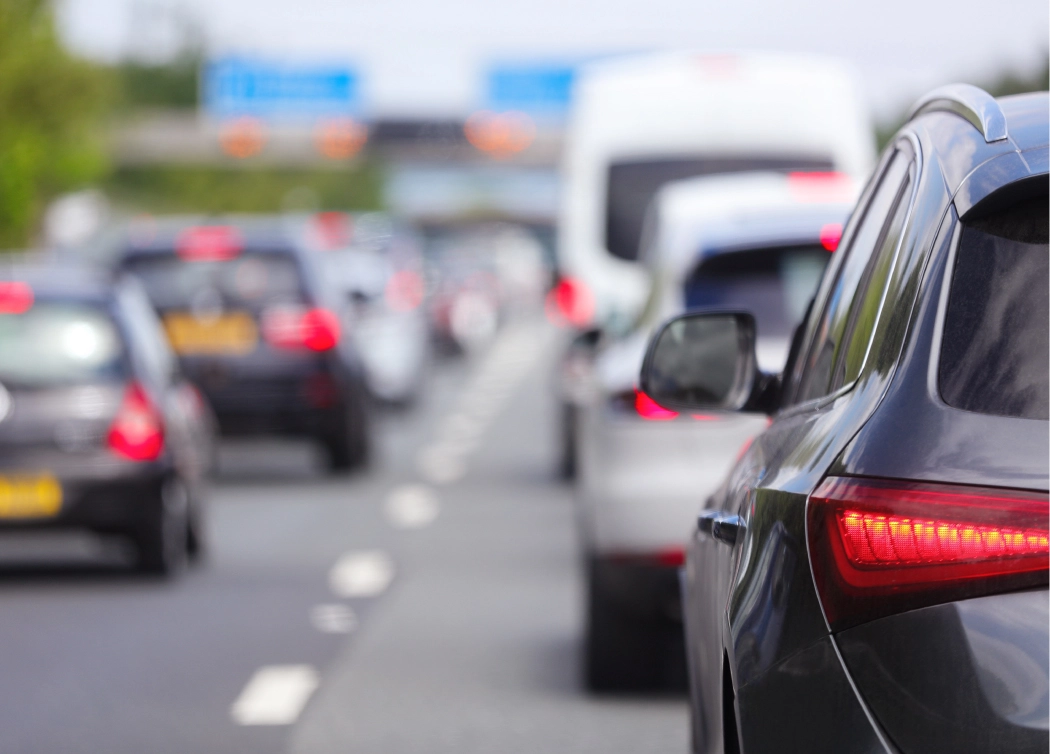How to prove a car accident wasn’t your fault
What to do in a motorway accident?
If you are involved in a motorway accident, it's important to know your next steps and how to make a non-fault claim.
Follow our guide below

The main causes of motorway accidents
Motorway accidents can happen at any time. Motorways are fast-paced and can therefore lead to serious collisions. The main causes of motorway accidents can vary.
What should I do in a motorway accident?
If you are unfortunate enough to be involved in a motorway accident, it is important to know what to do in order to keep yourself and others safe.
- Move your vehicle to a safe area (if possible) such as the hard shoulder. Make sure to turn on your hazard lights (if possible) and use a warning triangle if you have one available.
- Check if you or any passengers have sustained injuries from the car accident. If anyone in the vehicle has any serious injuries, call emergency services (999) and describe your location as accurately as possible. You can use your mobile, ask someone to call for you or use the motorway SOS call box to make the call.
- Those who are uninjured should try to move away from the vehicle to a safe place, ideally away from the road and hard shoulder. Remaining in or near the vehicle can put you and others in danger, especially immediately after the accident. Anyone who has sustained back or neck injuries should remain where they are, this to avoid creating more serious injuries that could prove fatal.
What should I do after a motorway accident?
Once you have checked everyone is safe and you are in a secure area, there are a few more steps you need to take in order to make the situation a little easier.
- Exchange details with the other driver and witnesses including: the drivers details, vehicle details, witness details and account, time/date of accident and weather conditions.
- Take Photographs and videos of the accident.
- Don’t leave the scene of the accident until all parties involved agree it is safe to do so.
- If you haven’t done so already, report the accident to the police within 24 hours. If you were involved in a collision as a driver or rider you must personally report the incident yourself as soon as possible and, in any case, within 24 hours of the collision. No one else can do this for you.
- Arrange vehicle recovery if needed. If the accident was not your fault, we can arrange vehicle recovery at no cost to you.
Speak to a Non-Fault Claim Specialist
We manage everything on your behalf, ensuring that the claims process is as smooth and stress-free as possible.
Back to the top

What should I do if I witness a motorway incident?
If you witness an accident on the motorway, you may be wondering what you should do. Make sure you always stay safe and act responsibly whilst offering assistance.
- Do not slow down unnecessarily. For instance, if the accident is on the other side of the motorway and does not affect the traffic on your side, you don’t need to slow down.
- Do not put yourself in danger.
- Turn on your hazard warning lights to warn other drivers that you are stopped.
- If possible, try to use a motorway SOS phone in order to give your exact location. If there is no motorway SOS phone available, dial 999 and try to give an accurate description of the location.
- Try to give emergency service operators clear descriptions of your location, what is happening, how many vehicles are involved and if there are any suspected injuries.
- Do not move anyone from their vehicles unless they are in immediate danger.
- If you are first aid trained, you may want to give assistance. If not, reassuring those involved can be comforting during this stressful time.
- If you believe you have any relevant information, and the police haven’t asked for your witness testimony already, call 101 to report it.
How can Auto Claims Assist help me after a motorway accident?
Auto Claims Assist can help you after a motorway accident in many ways, at no cost to you if the accident was not your fault.
We can:
- Supply 24/7 vehicle recovery - No cost to you if the accident was not your fault.
- Assign you to one of our dedicated claims handlers for a smooth process.
- Provide you with a like-for-like vehicle replacement whilst your car is off the road.
- Ensure your vehicle is repaired to its original standard, including any specifications.
- Connect you with our network of specialist Personal Injury Solicitors if you have sustained an injury.
Auto Claims Assist
First contact after a car accident
Start my claim online Call us on 0330 128 1407Do I have to pay excess if the accident wasn't my fault
Do I lose my no claims if the accident wasn't my fault
Will A Non Fault Accident Affect My Insurance
Accident Management VS Your Insurance Company
Complete Guide of What To Do In A Car Accident
Choosing Auto Claims Assist,
Your Trusted Claims Management Company
“Exceptional service throughout my claim. The communication from my case handler was superb. I would highly recommend Auto Claims Assist.”


15+
Years of expertise
1,000+
36,000+
Successful cases
Our team are ready to discuss the details of your accident and start your non-fault claim.
To getting started with Auto Claims Assist, simply call to us on 0330 128 1407 or start your claim online here.
What our customers say
Don’t just take our word for it. Our customers rate us ‘EXCELLENT’ on Trustpilot. See what they have to say about their experiences with Auto Claims Assist after a non-fault accident:


Request a call back
Our team of non-fault claim specialists are ready to answer any questions you have. Provide your details here to request a callback. One of our advisors will call you back as soon as possible. Alternatively, call us on 0330 128 1407 to speak to someone now.
Get your claim started by requesting a callback with our new claim team.
Fill in the below form and one of our advisors will call you back as soon as possible. Alternatively, call us on 0330 128 1407 to speak to us during working hours.